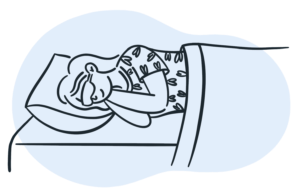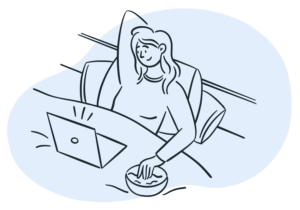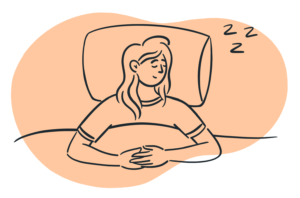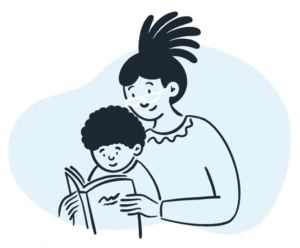Sleep Habits Survey
Disclosure: By clicking on the product links in this article, Mattress Nerd may receive a commission fee at no cost to you, the reader. Read full disclosure statement.
A staggering 50 million to 70 million Americans of all ages and socioeconomic classes suffer from sleep-related issues. The problem has reached such a critical level in the United States that the Centers for Disease Control and Prevention (CDC) declared insufficient sleep a “public health epidemic” with far-reaching consequences.
Sleep deprivation contributes to chronic health conditions, including diabetes, high blood pressure, heart disease, and even some cancers. It exacerbates mental health conditions and increases the risk for accidents, such as those involving motor vehicle accidents,
“Insufficient sleep, unlike other health risk factors such as smoking, excessive alcohol consumption, obesity, and physical inactivity, has historically received much less attention in the public health and clinical settings,” the CDC said in a news release. “Insufficient sleep is an important public health risk factor that would benefit from further investigation.”
Many lifestyle factors impact sleep. But some which we cannot control, such as our age or gender, may also be to blame. Mattress Nerd teamed up with Nolah Mattress on a survey among sleepers. Here’s what they found.
Sleep Habits by Age/Gender
Sleep needs change throughout our lifetime. We require the most cumulative hours of sleep as infants — 14-17 hours — and gradually require less as we age into childhood and our teenage years. By the time we reach adulthood, health experts recommend a minimum of 7 hours of sleep each night for optimal health and wellness.
However, a surprising number of people aren’t getting adequate sleep. We broke down our survey data by generation — Gen Z/Zoomers (18-24), Gen Y, Millennials (25-40), Gen X (41-56), and Baby Boomers (57-75) — and gender. We found these two factors may play a role in how well we sleep.
Sleep Habits by Generation
At least a third of all study participants, regardless of age, got less than 7 hours of sleep at night on average. Gen Xers topped the list at 43.4%, followed by Millennials with 39.9%, Zoomers with 38.1%, and Baby Boomers at 36.4%.
One of the primary symptoms of insomnia is difficulty falling asleep at night. More than half of all Zoomers (62.9%) and Millennials (57%) reported taking more than 20 minutes to drift off. Sleep doesn’t come much faster for Gen Xers (45%), either. But only 36% of Boomers had difficulty drifting off to sleep at bedtime.
Three-quarters of Gen Xers (76.7%) said they typically woke up during the night at least three nights per week — another tell-tale sign of insomnia. Boomers came in a close second at 68.2%. Fewer than half of millennials (47.5%) awaken during the night, while only 36.6% of Zoomers suffer this plight.
Overall, Boomers reported the least satisfaction with sleep with an average 5.6/10 sleep quality rating. But the younger generations aren’t faring much better. Millennials came in a close second with an average score of 6 followed by Gen Xers and Zoomers, both with a 6.3.
Sleep Habits by Gender
When it comes to gender, less than half of study participants who identify as male (41.9%) or female (36.3%) typically get less than 7 hours of sleep at night while more than half (55%) of those who identify as non-binary got less than enough shut-eye. Non-binary individuals also were significantly more likely (65%) to lie in bed 20 minutes or more at night before falling asleep compared to male (53%) or female (55.9%) respondents.
While about half of all genders report waking during the night at least three nights a week, female (50.6%) and non-binary (50%) individuals were more likely to experience night disruptions compared to male (44.9%) respondents.
Overall, those who identified as non-binary had the lowest sleep satisfaction score averaging 4.7/10, compared to those who identified as female and male, both of whom reported an average sleep quality score of 6.2.
Health/Mental Health Effects
Research has established the reciprocal relationship between sleep and mental health. According to a CDC study, approximately one-fifth of adults who report sleeping less than the recommended 7 hours at night live with a mental illness,
Depression, anxiety, and stress can significantly and adversely affect sleep by keeping sufferers from falling asleep at night or disrupting sleep throughout the night. Conversely, being deprived of adequate sleep can also trigger or worsen those mental health symptoms.
Overall, our study revealed that people who suffer from classic symptoms of insomnia — such as having difficulty falling asleep at night, disruptive sleep during the night, or getting less than the recommended 7 hours of sleep each night — were more likely to suffer from anxiety and depression. A whopping 82.7% of survey respondents listed “stress, anxiety, overthinking, or other uncontrollable thoughts” as the primary cause of their sleeplessness. Nearly half (48.2%) also reported experiencing high levels of stress.
When we took a closer look at how those mental health states broke down by age and gender, we found more surprises:
Mental Health and Age
There is little surprise that so many Zoomers have trouble falling asleep. According to our sleep study, Zoomers reported the highest stress compared to other generation groups with an average stress score of 6.3/10. Millennials weren’t far behind with 6.1, followed by Boomers with 5.7 and Gen Xers with 5.6.
More than half of Zoomers surveyed (58.6%) also reported being anxious, and almost half (44.9%) are depressed. Still, Zoomers’ mental health issues pale in comparison to Millennials, of whom 58.7% reported feeling anxious, and 46.6% said they were depressed.
Mental Health and Gender
The strongest link between sleep quality and mental health was found when we broke the stats of our survey down by gender. Not only did non-binary individuals report, on average, getting less than 7 hours of sleep at night, waking frequently at night, taking more than 20 minutes to fall asleep at night, and having the lowest sleep quality, they also experience substantially more anxiety, depression, and general stress than those who identified as male or female.
In fact, 90% of non-binary individuals are anxious compared to 63.7% of female participants and 41% of male participants. Eighty-five percent of those identifying as non-binary reported feeling depressed compared to 45.3% of females and 33.3% of males. Non-binary respondents also reported the highest stress level average among all genders — 7.3/10 — compared to 6.4 among females and 5.6 among males.
H3/Physical Health
A number of our study participants expressed concern with mental health issues. But many also dealt with physical pain. About one-third reported suffering from regular back pain and one-quarter said they dealt with regular neck pain. Most were combination sleepers, meaning they change positions frequently at night. About one-quarter of back and stomach sleepers also reported back pain, though neck pain was less frequent.
Shoulder pain was listed among physical health symptoms that can interfere with good sleep, primarily by combination and side sleepers. Hip pain also ranked high with combination sleepers and, surprisingly, stomach sleepers.
Another disruptive symptom was feeling too hot or sweaty during the night, which was bad enough to awaken more than 4 out of 10 of survey respondents.
Lifestyle/Habits That Impact Sleep
A person’s lifestyle can have a significant impact on sleep — either for the good or the bad. We asked study participants what types of activities they regularly engage in before bedtime and found that most consume large amounts of caffeine during the day — about 1-3 cups of coffee on average and 4 caffeinated sodas.
Caffeine is a stimulant that boosts blood pressure, heart rate, energy, and mood. And it’s notorious for interfering with sleep if consumed too late in the day. What many people may not realize is that the chemical has a half-life of up to five hours, meaning you can still feel the effects of an afternoon cup of coffee or soda hours later when you’re ready to tuck into bed.
We also found that a large number (85.2%) of participants sleep with their phones in or next to them in bed every night. About 25% of participants also said they use podcasts, audiobooks, music, or the TV to help them fall asleep at night. However, 71% of those individuals often lie in bed for more than 20 minutes before actually falling asleep. That’s no surprise considering electronic devices like TVs and smartphones emit blue light, a very high-frequency wavelength that stimulates the body and the mind and, thus, interferes with sleep.
When it comes to natural sleep aids, only 17.8% of participants said they take melatonin supplements at bedtime, whereas only 8.4% said they use CBD products to help them sleep. Surprisingly, those who used either melatonin or CBD for sleep had lower sleep quality scores (5.9/10 for each) compared to those who didn’t use the supplements (6.2).
Effects of Mattress on Sleep
One of the most significant factors that affects sleep quality and physical comfort is the quality of mattress one sleeps on, according to a study published in the Journal of Chiropractic Medicine. We asked study participants to tell us about their mattresses and how it impacts their sleep.
A good mattress can last 7-10 years, depending on its makeup and overall durability. However, nearly 24% of participants are sleeping on a mattress that has reached or surpassed its prime. More than three-quarters of them reported that they’ve noticed their mattress is worn or sagging —a proven recipe for backaches and the like.
Most people we surveyed say they are sleeping on a standard innerspring mattress (37.2%), followed closely by a foam or memory foam mattress (36.6%). Hybrids made with a combination of innerspring and a thicker layer of foam were the least popular at 21.8%. Many memory foam sleepers have a mattress with cooling technology — a must-have for hot sleepers as memory foam tends to sleep hotter than other types of mattresses. Only 1% of respondents opted for a natural organic latex mattress.
When it comes to comfort, innerspring mattresses were associated with more shoulder and hip pain as well as generalized soreness and physical discomfort. Hybrids, on the other hand, caused more pains in the neck. Memory foam sleepers were by far the hottest sleepers in the lot. Overall, innerspring mattresses were labeled too saggy, too noisy, lacking in flexibility, and ineffective at relieving pressure on bones, joints, and other pain points.
Despite the comfort issues survey participants expressed about their mattresses, more than a third (37.2%) said they were happy with their current mattress and, on average, gauged their mattress contentment at a modest 6.6/10.
Final Thoughts
Recognizing that lack of sleep in the U.S. has reached epidemic proportions, the CDC recently issued guidelines for healthcare providers encouraging them to “assess patients’ sleep patterns and discuss sleep related-problems” and “educate patients about the importance of sleep to their health.” Our sleep survey suggests age and gender may play a role in how well we sleep.
Identifying issues that interfere with good sleep can also lead to solutions, explains Wayne Giles, M.D., director of the CDC’s Division of Population Health. For example, making lifestyle changes “such as going to bed at the same time each night; rising at the same time each morning; and turning off or removing televisions, computers, mobile devices from the bedroom, can help people get the healthy sleep they need.”



